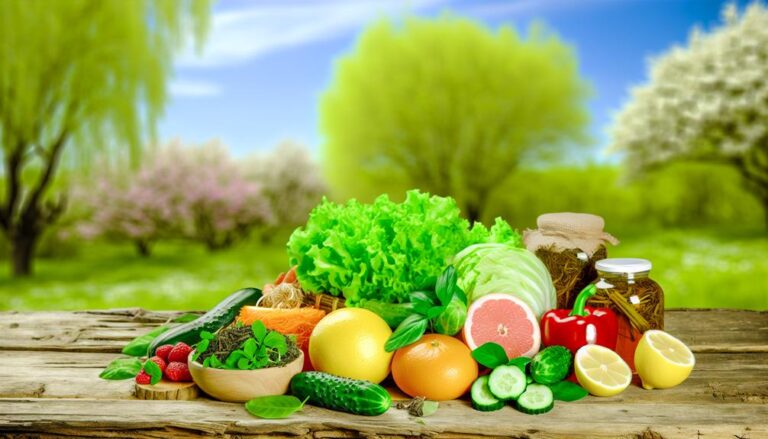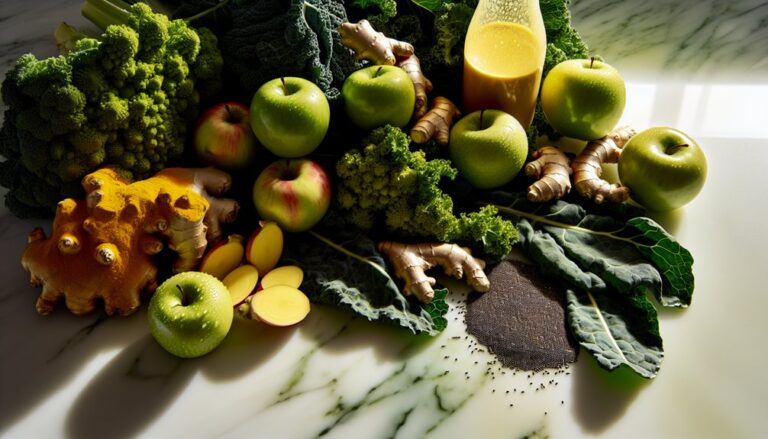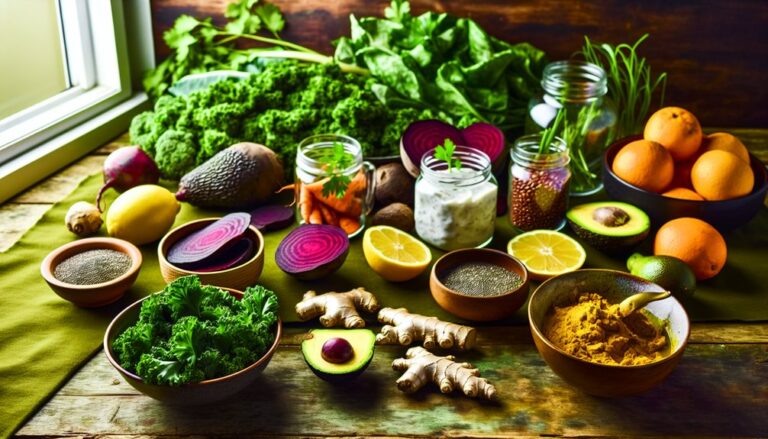
senior fitness videos;gyms near me for senior fitness;senior fitness test pdf;free senior fitness exercises;senior fitness

When you’re planning a liver detox diet, it’s essential to focus on what you eat and how you live your life. You’ll want to incorporate nutrient-dense foods like leafy greens and citrus while steering clear of alcohol and processed snacks. Staying hydrated and adding exercise can also enhance your results. However, the nuances of meal planning and monitoring your progress can make a significant difference in your journey. Understanding these elements can take your detox to the next level, and you might just uncover some surprising insights along the way.
Listen to the Summary
Key Takeaways
- Incorporate leafy greens, citrus fruits, and cruciferous vegetables to support liver detoxification and overall health.
- Stay hydrated by drinking at least eight 8-ounce glasses of water daily to aid toxin elimination.
- Avoid alcohol, processed foods, and high-sodium items that can strain liver function and impede detox efforts.
- Manage stress through relaxation techniques, yoga, and meditation to benefit liver health and overall well-being.
- Consider herbal supplements like Milk Thistle and Dandelion Root, but consult a healthcare professional for safety and effectiveness.
Understanding Liver Detoxification
Understanding liver detoxification is important for maintaining overall health. Your liver plays a significant role in detoxifying your body by filtering toxins and waste products from your bloodstream. It’s responsible for metabolizing nutrients and medications, ensuring your body functions effectively.
However, many detox myths can lead to confusion about how to support liver function efficiently. For instance, some people believe that drastic detox diets or juice cleanses can greatly enhance liver health. In reality, the liver is naturally equipped to detoxify itself, and extreme diets can sometimes do more harm than good.
Instead, focusing on sustainable lifestyle changes—like reducing alcohol intake, avoiding processed foods, and managing stress—can bolster your liver’s natural detoxification processes.
Additionally, hydration plays an essential role in supporting liver function, as water helps flush out toxins. While supplements and trendy detox products may promise quick results, they often lack scientific backing.
Educating yourself on what truly supports liver health can help you make informed decisions and debunk those detox myths. Remember, a balanced approach is key to nurturing your liver and maintaining overall well-being.

Foods to Include
Incorporating specific foods into your diet can greatly support your liver’s detoxification processes. By focusing on nutrient-dense options, you can enhance your liver’s ability to cleanse itself effectively.
Here’s a quick reference table of foods to include:
| Food Category | Examples | Benefits |
|---|---|---|
| Leafy Greens | Spinach, kale, arugula | High in chlorophyll, helps remove toxins |
| Citrus Fruits | Lemons, oranges, grapefruits | Rich in vitamin C, boosts liver function |
| Cruciferous Vegetables | Broccoli, cauliflower, Brussels sprouts | Supports detox enzymes production |
In addition, incorporating healthy fats, whole grains, and fermented foods can optimize your diet. Nuts and seeds provide essential nutrients, while antioxidant-rich berries combat oxidative stress. Lean proteins, like fish and chicken, help repair tissues. Don’t forget to add detoxifying herbs such as turmeric and cilantro to your meals for extra support.
Foods to Avoid
When focusing on liver health, it’s vital to avoid certain foods that can hinder detoxification.
Alcohol and sugary drinks can lead to inflammation, while processed and fast foods often contain unhealthy fats and additives.
Additionally, high-sodium options can strain your liver, so steering clear of these items is essential for peak function.

Alcohol and Sugary Drinks
Alcohol and sugary drinks can wreak havoc on your liver, making them key culprits to avoid in a liver detox diet. Excessive alcohol consumption is linked to liver disease, while high sugar intake can lead to fatty liver disease.
By steering clear of these substances, you give your liver the chance to heal and function effectively.
To help you navigate your detox journey, consider the following tips:
- Explore alcohol alternatives: Non-alcoholic beers, sparkling water with fruit, or herbal teas can provide satisfying options without the liver strain.
- Opt for sugar substitutes: Natural sweeteners like stevia or monk fruit can satisfy your sweet tooth without spiking your blood sugar or burdening your liver.
- Stay hydrated: Water is your best friend during a detox. Drinking enough water helps flush toxins from your body and supports liver function.
Processed and Fast Foods
Cutting back on processed and fast foods is essential for a successful liver detox. These foods often contain high levels of unhealthy fats, sugars, and preservatives that can hinder your liver’s ability to function effectively.
When your liver is overburdened, it can negatively impact nutrient absorption, making it harder for your body to utilize vitamins and minerals effectively. Fast foods are typically low in nutritional value and often lead to poor meal timing.
When you eat on the go, you might skip meals or consume unhealthy snacks, which disrupts your body’s natural rhythms and can lead to weight gain. This added weight puts extra strain on your liver, complicating its detoxification processes.

Moreover, processed foods often contain artificial additives that can create additional toxins in your body, further taxing your liver. By avoiding these foods, you give your liver a chance to heal and function more efficiently.
Focus on whole, unprocessed foods instead, as they provide essential nutrients and support your body’s natural detoxification pathways. Your liver will thank you, and you’ll feel more energized and balanced as a result.
High-Sodium and Fatty Foods
High-sodium and fatty foods can have a detrimental effect on your liver health, making it essential to limit their intake during a detox. Excessive sodium can lead to water retention and increase blood pressure, putting extra strain on your liver.
Additionally, unhealthy fats, particularly trans fats and saturated fats, can contribute to fatty liver disease and hinder the organ’s ability to detoxify effectively. Achieving sodium reduction and incorporating healthy fats is vital for a successful detox.
Here are three high-sodium and fatty foods you should avoid during your liver detox:
- Processed meats: Items like bacon, sausages, and deli meats pack a high sodium content and unhealthy fats that can harm your liver.
- Fried foods: Foods cooked in oils, especially those high in trans fats, can exacerbate liver issues and lead to inflammation.
- Salty snacks: Chips, pretzels, and other processed snacks often contain excessive amounts of sodium, which can hinder your detox efforts.
Hydration Importance
Staying hydrated is essential for your liver’s detoxification processes, as water helps flush out toxins and supports overall metabolic function.

You should consider various hydration sources, including plain water, herbal teas, and water-rich fruits and vegetables.
Water’s Role in Detox
Water plays an essential role in the detoxification process, serving as the body’s primary medium for flushing out toxins and waste products. Staying well-hydrated is vital for supporting liver function and overall health.
Here are some water benefits you should consider:
- Enhances Kidney Function: Adequate water intake helps your kidneys filter waste more efficiently, reducing the burden on your liver during detoxification.
- Promotes Nutrient Absorption: Water aids in the digestion and absorption of nutrients, ensuring your body receives the necessary vitamins and minerals to support the detox process.
- Helps Reduce Toxin Concentration: By drinking enough water, you dilute toxins in your bloodstream, making it easier for your body to eliminate them through urine.
To achieve ideal intake, aim for at least eight 8-ounce glasses of water daily, or adjust based on your activity level and climate.
Incorporate detoxifying beverages like herbal teas or infused waters for variety and added benefits.
Hydration Sources to Consider
When it comes to hydration, you can tap into a variety of sources beyond just plain water to meet your daily fluid needs. Staying well-hydrated is essential during a liver detox as it supports the elimination of toxins and maintains overall health.

Herbal teas are a fantastic option; they not only provide hydration but also offer additional health benefits. Varieties like dandelion or milk thistle tea can support liver function further.
Coconut water is another excellent choice, packed with electrolytes, making it a revitalizing way to replenish lost fluids.
Vegetable juices can also serve as flavorful hydration sources. Juicing vegetables like cucumbers and celery provides hydration along with essential vitamins and minerals that support detoxification.
Lastly, consider infuser water. By adding fruits, herbs, or even vegetables to your water, you can create a delicious and nutritious drink that keeps you motivated to stay hydrated.
This variety not only keeps your palate excited but also encourages you to drink more fluids throughout the day. By incorporating these diverse hydration sources, you enhance your liver detox experience while ensuring your body remains well-hydrated.
Incorporating Exercise
Incorporating regular exercise into your liver detox diet can greatly enhance your overall health and support the detoxification process. Engaging in various physical activities not only boosts your metabolism but also promotes better liver function.

By combining different workout types, you can achieve your fitness goals more effectively.
Here are three ways to incorporate exercise into your detox plan:
- Aerobic Exercises: Activities like walking, jogging, or cycling increase blood circulation, helping the liver flush toxins. Aim for at least 150 minutes of moderate aerobic exercise each week.
- Strength Training: Incorporating resistance exercises helps build muscle and improve metabolic rate. Try bodyweight workouts or resistance bands two to three times a week.
- Yoga Benefits: Practicing yoga enhances flexibility and reduces stress while promoting liver health. Consider joining group classes or following online sessions that focus on detoxifying poses.
Don’t forget about daily movement! Whether it’s taking the stairs or enjoying outdoor activities, every bit of physical activity contributes to your liver detox journey.
Stay consistent, and you’ll reap the benefits!
Managing Stress Levels
Managing stress levels is essential for supporting liver health during a detox diet. Chronic stress can negatively impact liver function, making stress management vital. Incorporate relaxation techniques such as breathing exercises and mindfulness practices into your daily routine. These methods can help you stay grounded and reduce anxiety.
Consider the benefits of yoga. Not only does it promote physical flexibility, but it also enhances mental clarity and emotional well-being.

Meditation is another powerful tool; studies show it can lower cortisol levels, which is beneficial for liver health.
Effective time management is key to achieving a good work-life balance. By prioritizing tasks and setting boundaries, you can prevent overwhelm and maintain a sense of control.
Don’t underestimate the power of nature exposure; spending time outdoors can greatly lower stress levels, boosting your overall well-being.
Additionally, lean on social support. Connecting with friends and family can provide emotional relief and encouragement during your detox journey.
Herbal Supplements
To support your liver during a detox diet, consider the potential benefits of herbal supplements. These natural remedies can enhance liver function and promote detoxification. However, it’s vital to prioritize herbal safety and proper supplement timing to maximize their effectiveness.
Here are three herbal options worth exploring:

- Milk Thistle: This popular detox herb is known for its liver-supporting properties. It may help protect liver cells and improve overall liver function.
- Dandelion Root: Often consumed as herbal tea or tinctures, dandelion root can aid digestion and stimulate bile production, which is essential for detoxification.
- Turmeric: Available in detox capsules or as a spice in meals, turmeric contains curcumin, a compound that has anti-inflammatory and antioxidant effects, promoting liver health.
Incorporating these herbal supplements into your detox plan can provide additional support for your liver.
Just remember to consult with a healthcare professional before starting any new supplement regimen to guarantee it aligns with your health needs.
Meal Planning Strategies
Planning your meals thoughtfully can greatly enhance your liver detox journey. Start with meal prep; take time each week to plan your meals and snacks. This not only saves you time but also helps you maintain portion control, ensuring you don’t overindulge.
Incorporate ingredient swaps to replace less healthy items with more detox-friendly options, like swapping refined grains for whole grains.
Utilize seasonal produce, which is fresher, more nutritious, and often more affordable. Batch cooking is another effective strategy; preparing large quantities of meals allows you to have healthy leftovers throughout the week. This reduces the temptation to grab unhealthy snacks when you’re short on time.
When cooking, focus on flavor enhancement through herbs and spices rather than salt or sugar. This keeps your meals enjoyable while adhering to detox principles.

If you’re craving a snack, opt for healthy alternatives like nuts, fresh fruit, or veggie sticks with hummus. By implementing these meal planning strategies, you’ll not only simplify your detox process but also cultivate lasting healthy eating habits.
Monitoring Your Progress
Tracking your progress during a liver detox is essential for understanding how your body responds to dietary changes. By keeping a close eye on your symptoms and overall well-being, you can make necessary adjustments to your detox plan.
One effective method is to maintain a symptom journal. This will help you identify patterns and triggers associated with your detox diet.
Here are three key strategies for effective progress tracking:
- Daily Check-Ins: At the end of each day, assess how you feel. Note any changes in energy levels, mood, or physical symptoms. This reflection will help you see improvements over time.
- Regular Measurements: Consider tracking physical metrics like weight or waist circumference if relevant. This can provide tangible evidence of your progress and motivate you to stay on track.
- Food Diary: Keep a detailed record of what you eat. This helps you identify which foods support your detox and which may be causing adverse reactions.
Conclusion
So, while you might think your liver detox diet is just about what you eat, it’s really a full-body approach. You’ll find that by skipping the cocktails and chips, and instead embracing greens and hydration, you’re not just detoxifying your liver—you’re also boosting your overall health. Ironically, the more you focus on your liver’s well-being, the better you might feel in every aspect of your life. After all, who knew that feeling great could come from eating your veggies?







